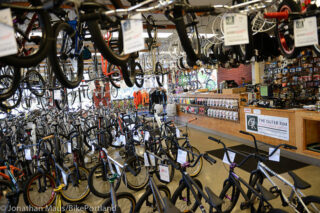
(Photo: Jonathan Maus)
Receipts from the first quarter for the $15 tax on new bicycles have been tallied by the Oregon Department of Revenue.
As of May 16th, the agency says they’ve processed about $77,000 in bike tax payments. The tax went into effect on January 1st and first quarter receipts were due April 30th.
The first reporting of figures from the tax came last week from Bicycle Retailer and Industry News. They reported a total of $34,065 in gross receipts; but that figure was a bit premature because DOR had only started collecting payments last month. After the BRAIN story broke we contacted DOR asking for an updated number and an estimate of administrative overhead costs.
DOR Communications Operations Manager Joy Krawczyk clarified to us that, “The amount provided to Bicycle Retailer & Industry News was from our monthly agency financial statement and reflected bicycle excise tax payments processed as of April 30, 2018. April 30 was the due date for the first quarter of payments and returns for the new tax, so any payments we received just before, on, or after the due date may not have been included in our April financial statement.”
Krawczyk also shared that as of March 31st, the agency had spent $47,000 to administer the tax — or about 61 percent of the total collected.
Advertisement
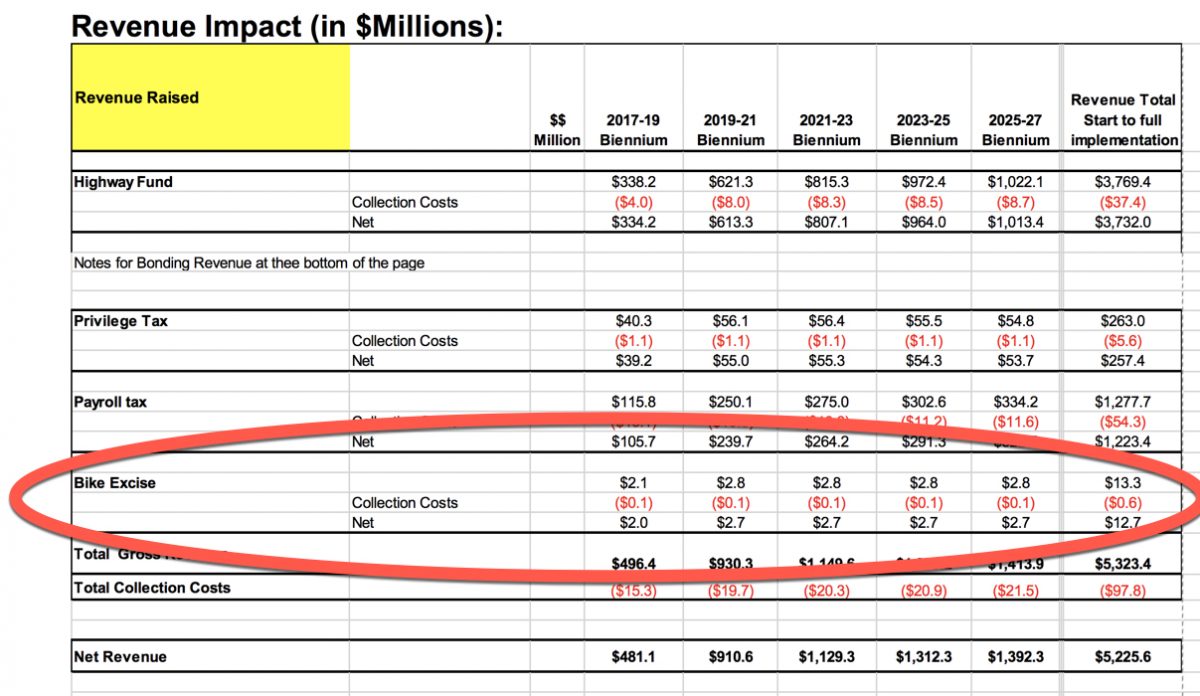
(State of Oregon Legislative Revenue Office)
When the bike tax worked its way through the legislature in 2017 as part of the $5.3 billion “Keep Oregon Moving” transportation package, the State’s Legislative Revenue Office estimated it would raise $1.05 million and cost $50,000 per year to administer.
After the first quarter it appears the bike tax is nowhere near reaching those expectations.
Just as an example, let’s say receipts average $85,000 per quarter — as more shops report and new bicycle types become eligible for the tax mid-June — and administrative overhead decreases to $35,000 per quarter as the agency smooths out kinks associated with the new tax. That would leave us with around $332,000 in gross receipts (one-third the expected amount) minus $152,000 in administrative costs (three times the expected amount), and $180,000 in net revenue (less than one-fifth the expected amount).
Legislators have mandated that this revenue can only be used for projects outside the highway right-of-way like multi-use paths and trails similar to the I-205 or Springwater Corridor paths. If these current trends continue it appears the new bike tax would be a tiny pot that will have to be leveraged by other revenue sources and matching funds in order to build anything significant.
Hopefully the meager initial receipts reflect the slow part of the biking season. As sales pick up through summer (and don’t forget Christmas!), revenues from the bike tax are likely to rise.
Bike tax receipts for the second quarter (ends June 30th) are due July 31st. Stay tuned.
UPDATE: I asked Krawczyk if admin costs were higher because this is a new tax. Here’s how she responded:
“The initial costs to stand up a program are higher than the costs to administer it long-term due to initial system configuration costs and the additional staff time needed to assist taxpayers in understanding the requirements of the new tax program. We expect to start seeing a decrease and then stabilization in administrative costs starting around the 12-month mark, but this is dependent upon whether there are additional changes to the law and the impact of those changes on the administration of the tax.”
UPDATE 5/23: In a presentation to the Joint Committee on Transportation at the state capitol today, DOR Operations & Policy Analyst Xann Culver said 111 bicycle retailers have registered and 83 filed returns as of March 16th.
— Jonathan Maus: (503) 706-8804, @jonathan_maus on Twitter and jonathan@bikeportland.org
Never miss a story. Sign-up for the daily BP Headlines email.
BikePortland needs your support.



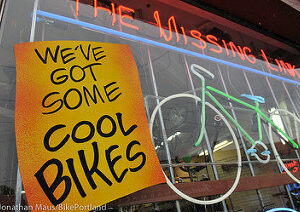
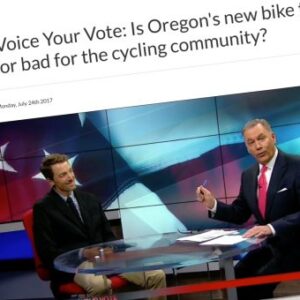
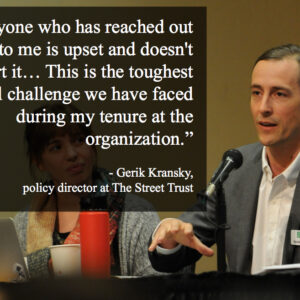
Thanks for reading.
BikePortland has served this community with independent community journalism since 2005. We rely on subscriptions from readers like you to survive. Your financial support is vital in keeping this valuable resource alive and well.
Please subscribe today to strengthen and expand our work.
That’s great — people paid $9 to have $6 collected from them for something that they shouldn’t have to pay in the first place.
I have an Idea. Lets make the bicycle excise tax the only funding source legal to be used for building, expanding or modifying highways in the metro area.
Would that get representative Rich Vial to expedite his wish list ?
Thanks to big government.
I’m not sure this is an example of *big* government so much as poor math. The cheeses who wanted to institute a Street Fee suffered from a similar (and very apparent) deficit in their math skills.
ODOT’s proposal for a mileage based tax, in lieu of the current $/gallon gas tax, suffers from the same problem – exorbitant administrative costs. The mileage fee would basically turn every auto owner into a direct payer (some collections would be “automatic” based on your car and GPS system, but consider that you might want to seek reimbursement for out of state travel or non-roadway use) instead of the current system where gas tax is paid to the state by a few dozen wholesaler gasoline dealers.
Remember all the recent strife surrounding the Arts Tax when City Council voted to remove the 5% cap on administrative costs even though that’s what was advertised? People were up in arms that the ~7% in costs was just too much and people should be held accountable.
The lede on this story might need to be something along the lines of: 61% of Bike Tax Lost to Administrative Fees. While the tax itself is wrong for many reasons, discussed at length here, deploying it in a way that most of the proceeds go to pay for the administration of the tax seems to actually be worse. This seems like a tax for the sake of saying that something is being taxed. For anyone opposed to Congestion Pricing, this right here is a great way to fight against it – don’t come out against the fee, make the argument that the state will be inept at collecting it efficiently.
If any elected official complains their tax isn’t generating enough revenue, the response is simple:
“If the state wants more money, they just need to get more people buying bikes.”
When we were researching bike licensing fees as a result of someone proposing one in Oregon what we found was that more places were eliminating the licensing than were adding it because they cost more to administer than they collected in revenue. The calculations here don’t even count the money that bike shops are spending to administer the tax for the state. Time to get rid of this bad idea.
I thought we had a congestion problem! People should be PAID to ride a bike instead of driving a car, not the reverse. OR again fails to walk the talk.
Not that I support the tax, but I presume there’s a big bump in bike sales during better weather, and December. Hence, it’s hard to really project out from such a small data set.
“The bicycle industry is a seasonal business that can be impacted by unusual weather, particularly late-arriving Spring weather.” https://nbda.com/articles/industry-overview-2015-pg34.htm
absolutely Evan. That’s a good point and one I forgot to mention in the article. That being said, I know many shops have already had banner spring seasons and have sold tons of bikes in April/May. I agree it’s a small sample set, but it doesn’t look good at all so far and I’ll be surprised if the estimates come close to being reached. Even if they do, I still think the tax is a failure. I hope people remember it’s terrible policy — regardless of how the revenue turns out (barring we don’t raise 100s of millions of course — which we won’t).
Seems like we could just burn $10 when we buy a new bike and call it even.
We already are. We just hadn’t thought to call it that (yet).
April/May would be Q2 though – I imagine that the numbers will go way up for the next quarterly report (for better or worse.
I bought my new bike in April (Thanks, River City!!) so I guess I’ll be part of that quarter’s tax revenue.
yes of course. good point. my mistake. And yes, I assume the receipts will go way up and the admin costs will stabilize. we’ll see.
Not necessarily– the state, I believe, is on a fiscal year ending June 30, not a calendar year so it might not follow that April/May would be Q2. It’s more like Q4.
My point was that the quarter that includes April/May hasn’t been tallied up yet, whichever number they give it.
Now there’s some good news. Not the silly tax, but your statement that you know of many bike shops that have had banner spring sales. I hope this is widespread and lasting.
Just the sort of story to unify Oregon’s “pet peeve” tax opponents with the anti-government, anti-tax-for-any-reason cranks.
The people of Oregon could vote out the idiots responsible for this state’s convoluted taxes being spent with less and less discretion, but who’s going to buy all those houses when they move?
That is exactly what it is and the state legislators got their wish.
But now cyclists can say “I paid my fair share!” when confronted by drivers who claim you don’t 🙂
Since that claim was faulty to begin with, and I’ve paid nothing new since the tax was added, what’s the actual difference again? Even more moral highground? Whoop de do.
Wait! “Fair share” tax? I thought this tax was for a “seat at the table.”
(Seems to me that if the game is buying seats at a table, it’s already a corrupt game.)
I do pay my fair share with property taxes. And with gas taxes when I fill my car and lawnmower. This tax negates our actual contribution to our roadways, especially the decreased wear and congestion that occurs when I’m on my bike.
I will admit it…I was wrong…I originally thought it would take more money to collect AND administer this fee than what the initial results show.
UPDATE: I asked Krawczyk if admin costs were higher because this is a new tax. Here’s how she responded:
wow, what a waste of everyone’s time. government at it’s worst.
What a conundrum for people who are pro-bike tax, and anti-government bureaucracy (probably just about everyone who’s pro-bike tax).
The $47k spent to collect the tax was as of March 31. The due date by retailers was not until April 30th. That leaves a month of collection time not accounted for when, presumably, the DOR was probably spending much time processing the information they received and therefore, should be counted toward expenditures of the first quarter revenue.
Also, what was the loss to bike shops in terms of time spent to pay the tax/file paperwork?
One upside is that $77K in revenue represents about 5000 new bicycles that found new homes in the past five months.
Almost all of which were made somewhere far away.
Do we really need more (new) bikes? Last I checked, we have something like 100,000,000 bikes in the US. Our problem is not too few bikes, but that the ones we own aren’t ridden very much.
True enough. But maybe the “newness” will inspire change.
I wouldn’t hold my breath.
Aspirational purchases are just that and most gear barely gets used. That’s not a new thing, but the trend in recent years has been focus on product and image rather than on actually doing anything. Maybe if we sell a fitness tracker that awards them virtual badges for everything they do, they’ll be inspired…
As to the tax, I’m hardly surprised that a poorly thought out tax aimed at a single product designed without regard for how point of sales systems work (how many other products are taxed differently depending on the sales price?) is not progressing swimmingly.
Are y’all aware that effective 1 June, the scope of the tax is being expanded to include bikes with smaller than 26″ wheels? Yes that’s right: it’s expanding to include kid’s bikes (alongside folders etc). That’ll teach all those little freeloaders (or rather their parents!) a thing or two about the transportation pecking order! Meanwhile you can get a fat rebate on an electric car with backover prevention video and hands-free internet because future something something.
Oh man! That was the only reason I was riding a Brompton…now that the circus has left town. 😉
The true test of this tax will be what it can deliver in terms of infrastructure that could not have been delivered without the tax. That remains to be seen but based on how this tax came about, by rural Republicans protecting rail and airport terminal funding to their districts, my prediction is that Connect Oregon will spend LESS on bicycle infrastructure as a result of the bicycle sales tax than it had before. Keep watching those numbers. I hope I’m wrong on this.
Given I frequent local bike shops for pleasure, and the occasional pair of socks or shot bloks, I’ll tell you what – let me collect the money at a 50% cut and it’s a win-win. Someone at ODOR knows how to set up Zelle, or Apple Pay Cash, right?
Not sure about the 205 path being outside the highway right of way. It seems to me like more of an example of the required bike infra mandated by the bike bill. The bike tax is really only meant to fund paths in parks so people will go ride their bikes around the lake and get off the roads.
It’s the first quarter of a new tax implemented in a huge overhaul of the transportation funding. If anyone is surprised that figures are off or that a learning curve is involved then what that really tells me is that the state did a poor job of explaining to the public that there’d be some pretty big kinks at the onset that get worked out over time.
Keep in mind this tax only applies to new bike purchases that have wheels of at least 26 inches in diameter and a retail sales price of $200 or more. Not stuff like socks, shot bloks…etc.
As someone mentioned earlier, this could impact how Connect Oregon spends $ on bike infrastructure. Considering Connect Oregon lost quite a bit of funding (loss of lottery funds) it wouldn’t be overly shocking to me.
Anyway, I’m interested to see how things progress after 12++ months. Not so trigger happy as to say that it needs to be stamped out after a single quarter of data.
If this was a charity it would be shut down for gross neglect in the use of funds.
This tax was Landlord Senator Rod Monroe’s baby. He was recently evicted with cause from his long-term senate seat.
Better evict his baby as well.
Perhaps the State should have a bicycle business license/ rental fee of $200 per bicycle “chop shop” for those in a tent along the ODOT right-of-way…now that would be some serious $ in the summer.
Oh you mean Republicans, who are all “small government” until they find something objectionable and then expect the laws to be changed to mollify their usually irrational ire?
See also: Parking minimums, zoning code (single family, height limits, etc), gay marriage, abortion, drug policy, etc.
I dont know ANY republican that is in favor of virtually any tax, much less a nonsensical tax that only serves to increase the footprint of an already bloated government that still is talking new tax after new tax. that and the fact that this was packaged with MANY other transportation taxes, hitting, sales tax on vehicle sales, registration fee increases, toll roads etc etc.
Pop into virtually any Oregonian story about transportation and read the comments.
UPDATE 5/23: In a presentation to the Joint Committee on Transportation at the state capitol today, DOR Operations & Policy Analyst Xann Culver said 111 bicycle retailers have registered and 83 filed returns as of March 16th.
So it protects the Walmart bike shaped objects and taxes real bikes. Ugh…
not an overhaul, just added taxes for the sake of taxes and growth of government. Overhaul would involve taking apart and rebuilding replacing things that are broken or not working. its rare to overhaul anything in government, just add on crap like the Winchester house.
Told you so.
Kinda like the Arts Tax.